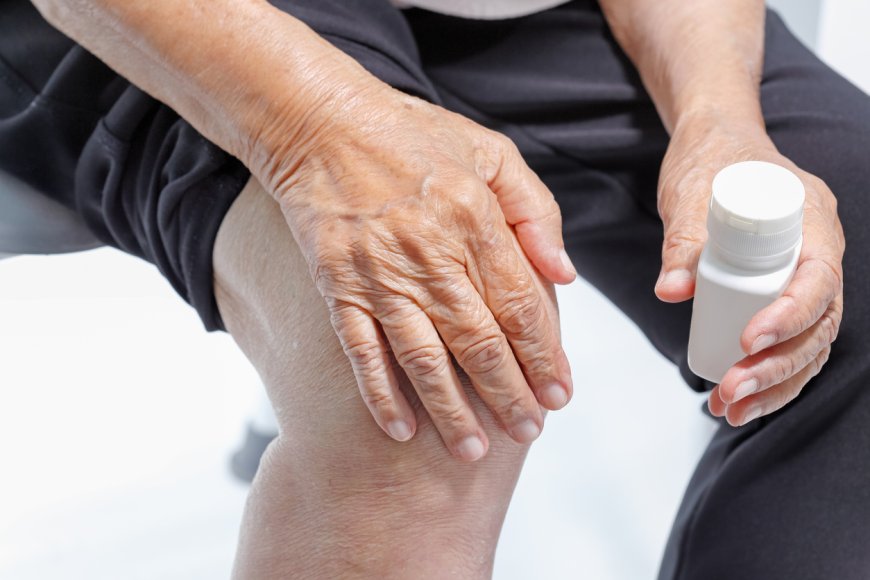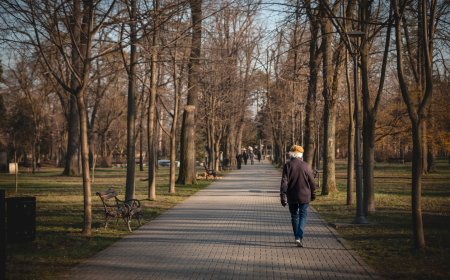The Future of Aging: Innovative Strategies for Overcoming Chronic Disease
In today's fast-paced world, where the pursuit of a long and healthy life is paramount, understanding the link between longevity and chronic disease becomes increasingly important. As advancements in medical science have increased life expectancy, the prevalence of chronic diseases has also risen. This comprehensive analysis aims to explore the intricate relationship between longevity and chronic disease, shedding light on the factors that impact life expectancy and offering insights into how individuals can enhance their chances of living a longer, healthier life.

In today's fast-paced world, where the pursuit of a long and healthy life is paramount, understanding the link between longevity and chronic disease becomes increasingly important. As advancements in medical science have increased life expectancy, the prevalence of chronic diseases has also risen. This comprehensive analysis aims to explore the intricate relationship between longevity and chronic disease, shedding light on the factors that impact life expectancy and offering insights into how individuals can enhance their chances of living a longer, healthier life.
The Alarming Decline in US Life Expectancy
Over the past few decades, life expectancy in the United States has experienced a concerning decline. Once considered a benchmark of a nation's success, life expectancy peaked in 2014 at 78.9 years and has been steadily decreasing since then. This decline is not solely attributed to the COVID-19 pandemic; rather, it is a result of a broader erosion in life spans caused by chronic diseases.
The Impact of Chronic Diseases on Life Expectancy
While opioids and gun violence capture public attention for their devastating effects, chronic diseases pose a far greater threat to the American population. Heart disease and cancer, in particular, remain the leading causes of death for individuals between the ages of 35 and 64. Moreover, other chronic conditions such as diabetes and liver disease have become increasingly prevalent, contributing to the poor life expectancy compared to other nations.
Chronic diseases, often developing in middle age, significantly reduce the number of years individuals can expect to live. In fact, chronic illnesses erase more years of life among individuals younger than 65 than all overdoses, homicides, suicides, and car accidents combined. The burden of chronic diseases is not limited to physical health; it also exacerbates socioeconomic and racial disparities, leading to a growing inequality in life expectancy.
The Role of Genetic Predisposition in Longevity
While chronic diseases undoubtedly play a significant role in reducing life expectancy, the influence of genetic predisposition should not be overlooked. Researchers at the Herbert Wertheim School of Public Health and Human Longevity Science at the University of California San Diego conducted a study to examine whether the association between physical activity, sedentary behavior, and mortality varied based on genetic predisposition for longevity. Their findings shed light on the interplay between genetics and lifestyle factors in determining life expectancy.
The Impact of Physical Activity on Longevity
Physical activity has long been recognized as a key factor in promoting longevity and overall well-being. Numerous studies have shown that regular exercise can reduce the risk of chronic diseases and improve overall health outcomes.
The Study on Physical Activity and Longevity
A study conducted by researchers at the Johns Hopkins Bloomberg School of Public Health investigated the relationship between physical activity, chronic conditions, and mortality. The study focused on individuals aged 67 and older and found that higher levels of light physical activity and moderate-to-vigorous physical activity were associated with a lower risk of death. Conversely, higher sedentary time was linked to a higher risk of mortality.
The Impact of Genetic Predisposition on Physical Activity
The study conducted at the University of California San Diego aimed to determine whether genetic predisposition for longevity influenced the association between physical activity and mortality. Surprisingly, the study found that the positive effects of physical activity on longevity were consistent across individuals with different levels of genetic predisposition. This suggests that even individuals who may not have a genetic advantage for a long life can still extend their lifespan by engaging in regular physical activity.
The Role of Sedentary Behavior in Chronic Disease and Longevity
While physical activity is essential for promoting longevity, the negative impact of sedentary behavior on health cannot be ignored. Sedentary behavior, characterized by prolonged sitting or low levels of physical movement, has been linked to an increased risk of chronic diseases and premature death.
The Dangers of Prolonged Sitting
Research has shown that excessive sitting time is associated with an elevated risk of developing chronic conditions such as obesity, cardiovascular disease, and diabetes. Additionally, sedentary behavior has been linked to increased mortality, independent of other risk factors. These findings highlight the importance of reducing sedentary behavior to improve overall health and extend life expectancy.
The Interaction Between Sedentary Behavior and Genetic Predisposition
The study conducted at the University of California San Diego also investigated whether genetic predisposition for longevity influenced the association between sedentary behavior and mortality. The results showed that the negative effects of sedentary behavior on mortality were consistent across individuals with different levels of genetic predisposition. This suggests that regardless of genetic factors, minimizing sedentary behavior can still have a significant impact on extending life expectancy.
The Importance of Lifestyle Modifications for Longevity
The findings from these studies emphasize the critical role of lifestyle modifications in promoting longevity and preventing chronic diseases. While genetic predisposition may play a role in determining life expectancy, it does not negate the importance of making positive lifestyle choices.
Recommendations for a Longer, Healthier Life
Based on the research conducted at Johns Hopkins Bloomberg School of Public Health and the University of California San Diego, the following recommendations can be made to enhance longevity and reduce the risk of chronic diseases:
-
Engage in regular physical activity: Aim for a combination of light, moderate, and vigorous physical activity to reap the maximum health benefits. Incorporate activities such as walking, jogging, strength training, and yoga into your routine.
-
Minimize sedentary behavior: Limit the amount of time spent sitting or engaging in activities with little physical movement. Take regular breaks from prolonged sitting and incorporate standing or walking into your daily routine.
-
Maintain a healthy weight: Obesity is a significant risk factor for chronic diseases. Adopt a balanced diet and engage in regular exercise to achieve and maintain a healthy weight.
-
Manage chronic conditions: If you have been diagnosed with a chronic disease, work closely with healthcare professionals to develop a comprehensive management plan. Adhering to prescribed treatments and making necessary lifestyle modifications can improve health outcomes and prolong life.
-
Prioritize preventive healthcare: Regular check-ups, screenings, and vaccinations play a crucial role in identifying and preventing chronic diseases. Stay up to date with recommended preventive healthcare measures.
-
Cultivate a supportive social network: Strong social connections have been linked to improved health outcomes and increased life expectancy. Prioritize building and maintaining meaningful relationships with friends, family, and community members.
-
Practice stress management techniques: Chronic stress can have detrimental effects on health. Incorporate stress management techniques such as meditation, deep breathing exercises, or engaging in hobbies to reduce stress levels.
-
Avoid tobacco and excessive alcohol consumption: Smoking and excessive alcohol consumption are major risk factors for chronic diseases. Quit smoking and limit alcohol intake to improve overall health and longevity.
By adopting these recommendations, individuals can take proactive steps towards a longer and healthier life, regardless of their genetic predisposition. While genetics may influence certain aspects of health, lifestyle choices remain within our control and have a significant impact on longevity.
Getting Older Doesn't Have to Mean Declining Brain Power
As we move through life and the years go by, it's easy to start worrying about our brains not working as well as they used to. Maybe we're forgetting things more often or finding it harder to focus. The good news is that through lifestyle choices like regular physical activity and quality sleep, we have more control over our cognitive abilities than we might think.
I'm in my mid-40s now and have definitely noticed little changes here and there with my memory and concentration compared to when I was younger. It was pretty alarming at first, but then I started paying more attention to the link between how I treat my body and how sharp my mind stays. The research is clear - moving our bodies and getting sufficient restorative sleep are huge factors in keeping our brains young.
Ever since I read about one interesting long-term study that followed over 9,000 participants from mid-life into old age, tracking how their lifestyles impacted cognitive decline, I've been more motivated than ever to prioritize activity and sleep. The people who were the most physically active and slept 7-8 hours per night consistently showed significantly less deterioration in areas like processing speed, visual memory, and executive function over time compared to their less active, poorly sleeping counterparts.
It really opened my eyes to realizing this is something I can directly influence through relatively small adjustments. So I started small by aiming for a 30 minute walk at lunch three times a week. I also made a point to shut off screens an hour before bed to wind down. The changes felt good for my body and mind, giving me more energy overall and mental clarity to better focus on tasks.
And I've learned the hard way that skimping on sleep comes back to bite me. When I'm tired, even simple decisions get foggy and I have less patience. I'm much more likely to zone out scrolling mindlessly on my phone instead of being engaged in conversations or activities. Obviously that's not a state I want my brain to be in regularly as I age. A consistent bedtime adhered to as closely as possible is well worth it for clearer cognition and mood.
There's comfort in knowing cognitive decline isn't inevitable as we grow older. Just a couple small tweaks like staying regularly active through exercise you enjoy and making sleep a high priority could help your brain stay youthful well into your later years. It's empowering to realize you have that kind of influence through lifestyle choices. No need to accept cognitive changes lying down - get moving your body and resting your mind instead for the brain power of a much younger you!
Conclusion
The link between longevity and chronic disease is complex and multifaceted. While chronic diseases pose a significant threat to life expectancy, lifestyle modifications such as regular physical activity and reduced sedentary behavior can mitigate these risks. The research conducted at the Johns Hopkins Bloomberg School of Public Health and the University of California San Diego underscores the importance of individual choices in promoting longevity, regardless of genetic predisposition. By prioritizing positive lifestyle behaviors, individuals can enhance their chances of living a longer, healthier life, free from the burden of chronic diseases.
Remember, the journey towards a longer and healthier life begins with small steps and a commitment to making positive changes. Start today, and embrace the power you have to shape your own destiny. Your future self will thank you
What's Your Reaction?













































































































